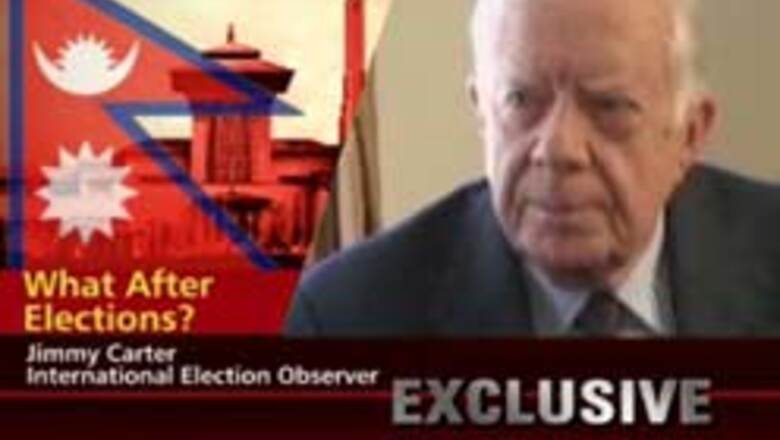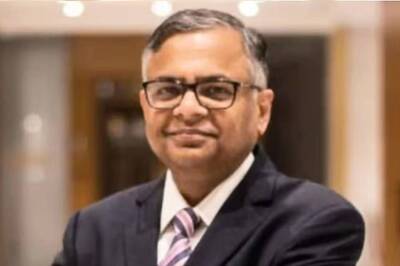
views
Kathmandu: Despite being gripped in violence that killed nine people and a shutdown in the Terai plains, Nepal on Thursday went to polls after a struggle of nearly 60 years.
Hundreds of international observers, including former US President Jimmy Carter, are in Nepal to monitor the polls. CNN-IBN Chief Diplomatic Correspondent, Paarull met Carter to find out what he thinks the future looks like for Nepal.
CNN-IBN: Are you concerned about the levels of pre-poll violence that you've seen?
Jimmy Carter: We would be disappointed with any violence but this is a country that has been at war for 10 years. Now they've made great progress in the last year and a half. So we're pleased with the commitment that the leaders of various parties have made about preserving peace.
Yesterday's violence was very unfortunate but I think elections will proceed as planned.
CNN-IBN: What do you expect to see on voting day?
Jimmy Carter: We have 62 observers scattered all over the country, and we'll be getting in reports to Kathmandu. I expect to see a large turnout between 50 and 60 per cent, which is good; and also a dedicated commitment by the citizens of this country, no matter what party they might belong, to have an honest, peaceful and fair election. All the leaders of the parties have committed to us and to each other that they will respect the verdict even if some will be disappointed. There's no doubt some of them will be disappointed compared to how they expect to do.
CNN-IBN: Do u think Prachanda will return to the jungles if he doesn’t get as many seats as he expects to?
Jimmy Carter: I wouldn’t anticipate that. I’ve met him three or four times since last June and I found him to be very reasonable. He and the other leaders, including YCL leaders, have committed themselves to abide by the results.
CNN-IBN: You met with Prime Minister Koirala as well. What are your impressions of him? Does he look like a confident leader leading his party to an election victory?
Jimmy Carter: I've met with all the leaders — of the NC, UML and Maoists. They all sound confident! Every one has told me they're going to get a majority, which is mathematically impossible! All the leaders expect to be prime minister within a few weeks or months, which is impossible! So they'll just have to accept the will of the people. I don’t know how to anticipate what that will be. But it’s a very complex system and more so than most countries, not more so than America's system, which may be the most complicated of all — but I don’t think there's any doubt that after these laborious weeks and months of intense negotiations that they all have accepted this system. I have good hopes about the proceedings.
CNN-IBN: What lies in store for Nepal after the CA? It doesn’t get easy, does it?
Jimmy Carter: My wife and I have been coming here for the past 20 years. I've been here three times in the last few months. After this political process is over and a new system of government is determined and the winners have accepted their wins and the losers have accepted their defeat with equanimity, then the next step is to start building on the future for economic development, education for children, training of jobs for those who've been employed on the battle field. The biggest single attraction would be the rapid advance of tourism. Nepal knows how to do this, it’s been done it in the past and I think under a republican form of government here with a democracy in place, there will be a much more determined commitment of all the people to make this nation prosper. So we have high hopes that the future of Nepal will be very bright.
CNN-IBN: What’s been India's role?
Jimmy Carter: I've met with almost all the ambassadors here in the last year or so and I don’t think there's any doubt that the Indian government has played the strongest single role compared to the other countries. They have a 1900-km border, there’s constant trade and traffic and commerce between the two people, and India has historically played a major role inside Nepal. I think the Indian ambassador has played a noble role not only in exerting a strong and proper diplomatic influence when necessary but always honouring the sovereignty of this country by not imposing the will of his powerful country on a smaller country, which is its neighbour. So even today we've been able to meet with the Indian ambassador and also the Chinese ambassador for instance, as well as others and I think that the ambassadorial staff here, the diplomats, have played a proper role but pre-eminent in influence would be India and I am very grateful for what the ambassador has done.




















Comments
0 comment